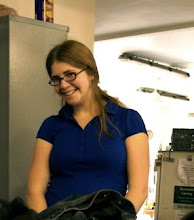One of the classes I'm taking is a social justice track, which in addition to class 2 days a week includes guest speakers, tiyulum (trips), and coordinating the volunteering for Pardes students. Today we had a guest speaker, Rabbi Levi Lauer. It was INCREDIBLY agitational, a real shofar blast and wake up call, apropos to this week leading up to Rosh Hashanah. Levi is the director of Atzum (http://atzum.org), an Israeli non-profit organization working with the families of terror victims, Righteous Gentiles, and against human sex trafficking in Israel, and he was also the dean of Pardes for several years.
Major points of what he said that really resonated with me, that I’m still mulling over:
- The search for meaning is more of a Jewish value than comfort – this is incredibly counter-cultural in Western culture
- We exist only as we exist in relationship with the Other (Levinas)
- Never look into the eyes of another human being unless you’re prepared to take full responsibility for them (Peter Singer)
- B’tzelem elohim nivra adam – not “human was created in the image of God,” but “for the sake of God’s image you were created”
- It is theologically obscene to think that God cares if you turn on the lights on Shabbat but not if you care about Rwanda (for example)
- You need to have courage to fail – justice is brought into the world when we take on things, b’chol l’vav’cha, b’chol naf’sh’cha, b’chol m’odecha (with all your heart, with all your soul, with all your m'od - loosely translated as all of your all), that are TOO BIG and fail – but in the failing, we put justice into the hands of those who didn’t have it before
- God is relational: if God addresses you, it is an invitation to DEBATE, not to assent
- Hineni = here I am, ready for existential debate
- one of the best parts of Jewish culture is debate, one of the worst is the notion that words will suffice
- the real (dangerous) power of words is that they are so powerful that they dull you to the pain and the bodies in the street
- Tanach (from Genesis to Deuteronomy to Chronicles) is the story of God’s withdrawal from the world in order to make room for human agency
- There is no personal salvation in Judaism – why it’s so hard to be a Jew – it’s all collective – my salvation is bound up with my next door neighbor…there is either interdependence or stagnation
- Chevruta can be an internalization of the idea that we are created to be in relationship
- move Torah and learning to the street – live it, study Torah in order to make the world a better place
- before praying the Amidah, Rabbi Lauer asks himself, “did I do anything in the past 24 hours that merits asking God for ANYTHING?”
- that you’ll never do well enough is not an excuse to not do better – all or nothing will always lead to nothing
All of these points were incredibly agitational and he was a very charismatic speaker. But what happens tomorrow? My class was very shook up and agitated for the rest of the afternoon…but what is different now that we’ve heard this? I've heard Ruth Messinger speak on several occasions, and she always agitates me - but my behavior never changes the next day. One classmate asked if I still wanted to be a rabbi after hearing that, and my answer was emphatically yes. I deeply feel that by being a rabbi in a congregation, helping that community be in relationship with the Other and act on their values, through which we search for meaning in our collective Jewish life, then more justice is brought into the world.
The question I’m wrestling with now, in this week prior to the High Holidays, is how my study of Torah this year, Torah study that is purely for the sake of learning, can make the world a better place. How do I live my life (because this isn’t a year off from my life), no matter what I am primarily engaged in (learning, grad school, working, etc.) in a way that brings justice to the world?
Ultimately, much of what Rabbi Lauer said today is that it is more important to walk the walk than only talk the talk. 6-7 years from now, I don’t want to stand on a bimah on Rosh Hashanah and talk the talk. How will I walk the walk in this coming year? How will I be in relationship with the Other? How will I bring my Torah learning, that I am loving so much, to the street and live it?
(Shout-out to Christopher, who asked about classes and if I'd be writing about them in the blog! Best chevru-team ever!)




No comments:
Post a Comment